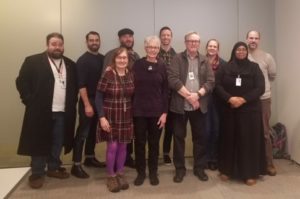Humanist EDge: The Humanist Studies Program: Humanism in Theory, Humanism in Life

In 2018 I started searching for a divinity program that would support a nontheistic, secular humanist theological formation. I was looking for a curriculum and cohort that would guide, challenge, and hold me accountable for my theology/philosophy and its application through the work I wanted to do in the world. The program also needed to be practical. I didn’t have the luxury of leaving my paid work to attend school, and as a “non-traditional” student, I wanted a curriculum that would take my life experience and trajectory into account.
That December I ended up on the phone with Kristin Wintermute, director of education for the American Humanist Association, who told me about a developing partnership between their Center for Education and Meadville Lombard Theological School—what led to the now restructured Humanist Studies Program. Wintermute generously connected me with several students and alumni from Meadville who were willing to share their experiences of Meadville’s programs. A few months later I was accepted into training as an Ethical Culture leader with the National Leaders Council of the American Ethical Union, which requires its own graduate-level equivalent curriculum. The Humanist Studies courses were a good match for this curriculum and the program I had been seeking, and Meadville’s low-residency, contextual education model meant that I could complete the courses without relocating or taking a leave from work.
It’s not often that we have the opportunity to engage in open, reflective discourse about humanism with folks who come from different faith and secular traditions throughout the country. I’ve recently returned from a weeklong intensive residency with nine other deeply thoughtful students of life as part of the first course in the Humanist Studies Program, titled “The Nature of Being.” We’d spent the last few months surveying and responding to humanist readings sourced from a variety of traditions that detail a categorical and experiential understanding of humanism. Weekly videoconferences facilitated by Rev. David Breeden enhanced our analysis of the readings and anchored us in pragmatic inquiry, always coming back to the questions: Where is humanism? Where is it headed?
Throughout the week, our group of theists, nontheists, and atheists explored how humanism is relevant to each of our journeys. Each of us came to humanism from our own place, and it was these explorations that transformed the humanist theories from the course readings into something that could be, and was being, substantively lived. Perhaps most importantly, these descriptions of humanism “in the wild” painted a picture showing where we held common ground in humanist values. This is not to say that there was always agreement, but the challenge and discovery of describing a humanism that could work in each context outlined some frontiers for the movement at large. These frontiers are significant in considering where humanism is headed, particularly with regard to how a contemporary humanism can make space for and synthesize the experiences of marginalization, exploitation, and oppression.
We’re facing an era of critical system failure—social, cultural, political, and institutional systems—whose corresponding crises will transform how we navigate the world, for better or for worse. My hope is that humanism, in all its expressions, can adapt to serve the needs that will emerge from this transformation. My learning at Meadville through the Humanist Studies Program is preparing me for the next stage of my vocation, a way of serving responsively and responsibly in support of people navigating a rapidly-changing world.
I registered for this course to deepen and broaden my own understanding of humanism—its legacy, historicity, and relevance to our contemporary context. The course has provided me with a framework for defining a humanism grounded in our shared human experiences. As an Ethical Cultural leader in formation, this framework provides me with a solid foundation from which to refine a nontheist theology/philosophy that can steward the future of humanism, whether through work with Ethical Societies, congregations, unaffiliated groups, or out “in the wild.”
I’m grateful to my fellow students for this experience, to Kristin Wintermute for her invaluable guidance and encouragement, and to the American Humanist Association and the American Ethical Union for making it possible to participate in the class.
Learn more about the Humanist Studies Program on the AHA Center for Education website. Registration for spring 2020 courses is open now!
